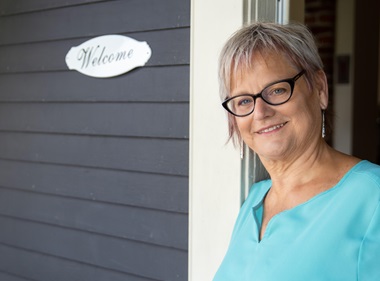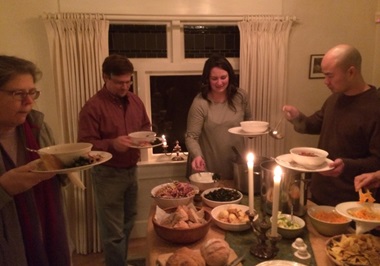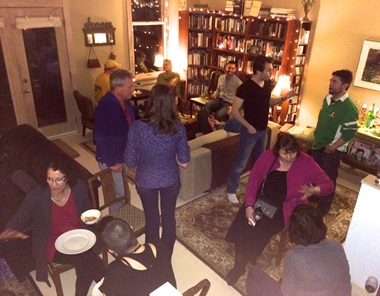
Karen Reed loves to welcome her neighbours.
Neighbours. You know, those people who live around us in our specific neighbourhood, that we didn’t choose and may not like or even know their names. How are we to think about neighbours?
Could it be that neighbourliness is the most important value for us to hold and live out?
Several years ago I began a process of reorienting my entire way of life within the proximity of the neighbourhood, out of a longing for a more integrated way of living and a deeper experience of connection and community.
I began deceptively simple practices – that I now think have the potential to be staggering in their scope in helping us and others live well. My imagination was sparked for another way of living and being.
For most of my life, I lived on adrenaline and deadlines. Neighbours were marginalized with my busy life, but the few I knew usually received friendly and quick hellos as I was coming or going in car. A culture built on speed and scale tends to neglect relationships – especially those deemed optional, which is the way neighbours are often viewed.
Then I moved East Vancouver, and without realizing it, I slowly began to shift lifestyle practices. I sold my car and began to use transit or my bike. I built a food garden and sought gardening tips from my Italian neighbours. I eventually started getting to know neighbours by name, and began inviting a few in for a drink or a meal. I learned how to borrow things from neighbours (especially tools), instead of insisting on having my own, which affirms our inter-dependence.
Our lives have become so fragmented and privatized and independent – which has set a course for isolation and alienation – that we have learned to function in our daily life without knowing even one neighbour’s name. I’m learning that the simple, ordinary practices that enable a community to flourish tend to be diminished in value when we don’t depend on each other practically. Productivity and dehumanizing efficiency dominate our lives.

Karen Reed began with soup nights, inviting her immediate neighbours.
It takes time to get to the place where you know your neighbours and can experience connection and a sense of belonging in a neighbourhood.
I continue to be stunned at how simple acts can be so meaningful to people, especially if they are feeling isolated (and Vancouver Foundation research has revealed that one in four people in our city is isolated). Small gestures that remind people they are seen and thought about and known can help us all feel not so alone.
The second year I was here, I began hosting regular soup nights, inviting my immediate neighbours to drop in for a simple meal of homemade soup. We eventually averaged about 35 – 45 people, with almost every decade represented. Most people tend to gather with their ‘tribes,’ so people loved it.
Where else like the neighbourhood can diversity gather? A few times I was greeted at the door with someone saying to me that they came because they wanted to meet the women who invited strangers into her home! How did we allow that to become such a strange practice?
The majority of my neighbours have lived here for 10, 20 or 30-plus years, yet most only knew a few other neighbours by name. I was the newbie, and yet I found myself introducing neighbours to each other. Now, the majority have exchanged emails and many even have shared their house keys.
After we together weaved a bit of social fabric as a neighbourhood, we put our hand collectively to sponsor a refugee family, raising $50K as a neighbourhood, welcoming a family who moved in across the street. Working together fast-tracks relationship building as we worked through diverse opinions and personalities.
You sacrifice when you are committed to something larger than yourself and what could only be done together. How can we push against valuing the private over the common?
Getting up close with people doesn’t create problems as much as it reveals issues (think of iron sharpening iron – sparks fly!). We don’t develop our character in isolation, but rather it grows in the context of our relationships, in the tensions and resolutions.
Author and theologian James Houston highlights that there is no such thing as personal maturity, but only ‘social maturity’. I mature at the pace of the community of people around me – as we work out and grow through conflict, stress, acceptance, forgiveness, differences, struggles etc. We do need each other to grow our awareness of ourselves and to mature, especially those not like us. These relational dynamics contribute to helping us all become more fully human and alive.

Neighbourhood gatherings allow people to meet others from outside their ‘tribes.’
Sociologists have been sounding the alarm regarding our plummeting social capital; the absence of it is impoverishing our lives and communities. It is what builds civil society (which contributes to a stronger democracy).
There is a growing understanding about the richness of life that has been lost within our fragmented and isolated lives, and attention is now being given to restore the historic nature of neighbourhoods. The close proximity and frequency to run into neighbours is what builds social capital – that relational fabric in a community.
Could it be that this social connectedness contributes to a person’s sense of wellbeing more than we have understood and, shockingly, that our own maturity and personal thriving is connected to our neighbourliness. Maybe this is why Jesus Christ declared loving neighbour as primary.
Our deepest principles and maturity are reflected to those who may or may not be friends, but are within our realm to include, notice and care for. When we take an interest in our neighbours, we begin to encompass universal ethics: you won’t steal from or slander them, or feel superior to them, but reflect truth-telling, kindness and empathy, patience and forgiveness.
It’s a movement away from prejudices and hate, which shrinks not only our hearts but also our humanity and ultimately our society. It’s far easier to care for those you love, but more revealing of our morality is our relationship with the neighbour, who is easily ignored.
These common ethics and practices enable us to belong to one another across all kinds of divides. If we disregard, despise, neglect those in closest proximity to us, we may contribute to their isolation and maybe even our own. Our common deep need for goodness gets practiced and honed in the neighbourhood, in relationship with others, not just in the private. And what is embodied in our neighbourhoods is what becomes our society.
Our culture often feeds the delusion that we can live autonomously and self sufficiently. We cannot. It’s a lie that has diminished us. We need each other, and neighbourliness helps us practice that reality. In the process of practicing that goodness toward the other, both we and our neighbours may find ourselves flourishing and discovering what it means to live well by loving well.

This is a terrific and hopeful article! It has inspired me to give it a try in my new neighbourhood. Thank you!
Such an insightful vision which includes so many moving parts. Much more than a thought, but a vision not only realized but it continues to evolve into something community-based, embracing citizens who have found themselves not only isolated but without purpose and hope and so much more. Wow! I not only celebrate the realization of your vision but your heart and the fact that you listened and responded.
Blessings upon blessings.
Your ‘long obedience’ in the direction of ‘loving your neighbour as yourself’ and modeling ‘neighbourliness’ goes way beyond exemplary – it’s winsomely prophetic, hopefully revolutionary!
Wonderful journey that you are on Karen. May the Lord multiply you.
Karen Reed stewards one of the most ‘significant ministries’ in Vancouver. Multiple boxes are checked when the terms ‘significant’ and ‘ministries’ are used in this city. Karen’s neighbourliness and those boxes are oxymoronic. Therein lies its magic.